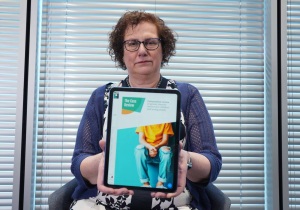(This item first appeared in the Brighton Argus on 17th December 2024)
It was George Bernard Shaw who said: “The British and the Americans are two great peoples divided by a common tongue.” That might not be quite true, but we have had different dialects, but these, too, are merging with the Americanisation of the English language. This is nothing new. Speaking on the wireless in 1935, Alistair Cooke declared that “Every Englishman (sic) listening to me now unconsciously uses 30 or 40 Americanisms a day”.

Dr Hilary Cass with her report on NHS services for children and young people who are questioning their gender identity or experiencing gender dysphoria
When I first came to the U.K., even though I was a first generation South African from an English-speaking family, I used words and phrases that were not understood in Brighton. ‘Red robots’ and ‘circles’ in the road meant nothing to Brightonians who said ‘traffic lights’ and ‘roundabouts’. Before then, my father and his brother who were born and brought up in Stoke-on-Trent, could communicate with each other in the North Staffs dialect that the rest of us struggled to comprehend. A more famous saying, now available as an inscription on mugs, asks: “Cost tha kick a bo agen a wo an yed it til thee bost eet?” It means: “Can you kick a ball against a wall and head it until it bursts?” My aunt Dorothy, who lived in the Potteries, would call me “duck” – a common term of affection towards both men and women as in “Tow rate owd duck?” meaning “Are you all right dear?”
Our language and local dialects are being lost thanks to our arrogant cousins from across the Atlantic. We no longer have tomato sauce but ketchup. Chips are now fries (though not in South Africa where crisps are called chips). Mac and cheese, keeping you across all the news, and cookies are just a few other examples. Why can’t we say macaroni cheese, keeping you up-to-date, and biscuits? Computers have given new meanings to common words like apple, windows, mouse and cookies.
‘Sussex as she wus spoke’ is a delightful guide to the Sussex dialect by Tony Wales. I learned some gems from this book: ‘all mops and brooms’ (to be in a muddle), a ‘bum-freezer’ (short coat), and ‘so drunk he couldn’t see through a ladder’ (very drunk). Many of the words and sayings are, to me, ‘wimwams for goose’s bridles’ (something not understood). This column gets its shares of ‘balsam’ (uncomplimentary remarks) but I hope I will be spared on this occasion.
In George Orwell’s Nineteen Eighty Four, ‘Newspeak’ limited a person’s ability to articulate and communicate abstract concepts, such as personal identity, self-expression, and free will, which were described as ‘thoughtcrimes’, acts of personal independence that contradicted the ideological orthodoxy. Orwell explained that Newspeak is a language characterised by a continually diminishing vocabulary where complete thoughts are reduced to simple terms such as Minitrue (Ministry of Truth), and Miniplenty (Ministry of Plenty).
Political discourse today has adopted a similar approach. The most obvious recent example has been the ability to close down debate on women’s sex-based rights by accusing someone of being a TERF (a trans-exclusionary radical feminist) or being ‘transphobic’ when questioning the ideological orthodoxy of trans-rights.
After the publication last week of the thoughtful and authoritative Cass Report on NHS services for children and young people who are questioning their gender identity or experiencing gender dysphoria, it has been interesting to see which politicians have backtracked on their previously-held views. These same people never lifted a finger to defend the likes of Professor Kathleen Stock (hounded out of Sussex University for her gender critical views) or the Labour MP Rosie Duffield (ostracised and abandoned by her party’s leadership). These latter-day converts are yet to apologise to Kathleen or Rosie, or the countless other women and some men (like Father Ted creator, Graham Linehan) who have spoken out so bravely. Yet some of those who said nothing are now calling for a ‘kinder’ dialogue when through their previous silence they were complicit in a hateful ideology.
This ideology has, for almost a decade, captured politics and, most alarmingly, the NHS. Children have been put on toxic medication that can lead to an increase in cancers and infertility, and young people have been mutilated by the removal of perfectly healthy organs. And here again language has been corrupted. As my friend, Helen Saxby, explained, “it’s urging caution and research in the treatment of children that has been smeared as ‘hate’, and playing fast and loose with children’s health that has been rebranded as ‘love’.” It is people like Helen who will be judged as being on the right side of history, and that history has begun to be written through the Cass Report.


